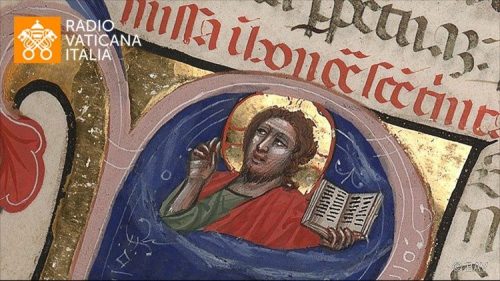READING OF THE DAY
First Reading from the Book of the Prophet Jeremiah
JER 1:4-5, 17-19
The word of the Lord came to me, saying:
Before I formed you in the womb I knew you,
before you were born I dedicated you,
a prophet to the nations I appointed you.
But do you gird your loins;
stand up and tell them
all that I command you.
Be not crushed on their account,
as though I would leave you crushed before them;
for it is I this day
who have made you a fortified city,
a pillar of iron, a wall of brass,
against the whole land:
against Judah’s kings and princes,
against its priests and people.
They will fight against you but not prevail over you,
for I am with you to deliver you, says the Lord.
Second Reading from the First Letter of Paul to the Corinthians
1 COR 12:31 – 13:13
Brothers and sisters:
Strive eagerly for the greatest spiritual gifts.
But I shall show you a still more excellent way.
If I speak in human and angelic tongues,
but do not have love,
I am a resounding gong or a clashing cymbal.
And if I have the gift of prophecy,
and comprehend all mysteries and all knowledge;
if I have all faith so as to move mountains,
but do not have love, I am nothing.
If I give away everything I own,
and if I hand my body over so that I may boast,
but do not have love, I gain nothing.
Love is patient, love is kind.
It is not jealous, it is not pompous,
It is not inflated, it is not rude,
it does not seek its own interests,
it is not quick-tempered, it does not brood over injury,
it does not rejoice over wrongdoing
but rejoices with the truth.
It bears all things, believes all things,
hopes all things, endures all things.
Love never fails.
If there are prophecies, they will be brought to nothing;
if tongues, they will cease;
if knowledge, it will be brought to nothing.
For we know partially and we prophesy partially,
but when the perfect comes, the partial will pass away.
When I was a child, I used to talk as a child,
think as a child, reason as a child;
when I became a man, I put aside childish things.
At present we see indistinctly, as in a mirror,
but then face to face.
At present I know partially;
then I shall know fully, as I am fully known.
So faith, hope, love remain, these three;
but the greatest of these is love.
GOSPEL OF THE DAY
From the Gospel according to Luke
LK 4:21-30
Jesus began speaking in the synagogue, saying:
“Today this Scripture passage is fulfilled in your hearing.”
And all spoke highly of him
and were amazed at the gracious words that came from his mouth.
They also asked, “Isn’t this the son of Joseph?”
He said to them, “Surely you will quote me this proverb,
‘Physician, cure yourself,’ and say,
‘Do here in your native place
the things that we heard were done in Capernaum.'”
And he said, “Amen, I say to you,
no prophet is accepted in his own native place.
Indeed, I tell you,
there were many widows in Israel in the days of Elijah
when the sky was closed for three and a half years
and a severe famine spread over the entire land.
It was to none of these that Elijah was sent,
but only to a widow in Zarephath in the land of Sidon.
Again, there were many lepers in Israel
during the time of Elisha the prophet;
yet not one of them was cleansed, but only Naaman the Syrian.”
When the people in the synagogue heard this,
they were all filled with fury.
They rose up, drove him out of the town,
and led him to the brow of the hill
on which their town had been built,
to hurl him down headlong.
But Jesus passed through the midst of them and went away.
WORDS OF THE HOLY FATHER
Dear Brothers and Sisters, Good morning!
In today’s Gospel, before presenting Jesus’ programmatic speech in Nazareth, Luke the Evangelist briefly recounts the work of evangelization. It is an activity that Jesus carries out with the power of the Holy Spirit: his Word is original because it reveals the meaning of the Scriptures; it is an authoritative Word because he commands even impure spirits with authority, and they obey him (cf. Mk 1:27). Jesus is different from the teachers of his time. For example, he doesn’t open a law school but rather goes around preaching and teaching everywhere: in the synagogues, on the streets, in houses, always moving about! Jesus is also different from John the Baptist, who proclaims God’s imminent judgment. Instead Jesus announces God’s fatherly forgiveness.
Now let us imagine that we too enter the synagogue of Nazareth, the village where Jesus has grown up, until he is about 30 years old. What happens is an important event, which delineates Jesus’ mission. He stands up to read the Sacred Scripture. He opens the scroll of the Prophet Isaiah and takes up the passage where it is written: “The Spirit of the Lord is upon me, because he has anointed me to preach good news to the poor” (Lk 4:18). Then, after a moment of silence filled with expectation on the part of everyone, he says, in the midst of their general amazement: “Today this scripture has been fulfilled in your hearing” (v. 21).
Evangelizing the poor: this is Jesus’ mission. According to what he says, this is also the mission of the Church, and of every person baptized in the Church. Being a Christian is the same thing as being a missionary. Proclaiming the Gospel with one’s word, and even before, with one’s life, is the primary aim of the Christian community and of each of its members. It is noted here that Jesus addresses the Good News to all, excluding no one, indeed favouring those who are distant, suffering sick, cast out by society.
Let us ask ourselves: what does it mean to evangelize the poor? It means first of all drawing close to them, it means having the joy of serving them, of freeing them from their oppression, and all of this in the name of and with the Spirit of Christ, because he is the Gospel of God, he is the Mercy of God, he is the liberation of God, he is the One who became poor so as to enrich us with his poverty. The text of Isaiah, reinforced with little adaptations introduced by Jesus, indicates that the messianic announcement of the Kingdom of God come among us is addressed in a preferential way to the marginalized, to captives, to the oppressed.
In Jesus’ time these people probably were not at the centre of the community of faith. Let us ask ourselves: today, in our parish communities, in our associations, in our movements, are we faithful to Christ’s plan? Is the priority evangelizing the poor, bringing them the joyful Good News? Pay heed: it does not only involve doing social assistance, much less political activity. It involves offering the strength of the Gospel of God, who converts hearts, heals wounds, transforms human and social relationships according to the logic of love. The poor are indeed at the centre of the Gospel.
May the Virgin Mary, Mother of evangelizers, help us to strongly perceive the hunger and thirst for the Gospel that there is in the world, especially in the hearts and the flesh of the poor. May she enable each of us and every Christian community to tangibly bear witness to the mercy, the great mercy that Christ has given us.
(Angelus, 24 January 2016)

